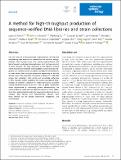| dc.contributor.author | Smith, Justin D | en_US |
| dc.contributor.author | Schlecht, Ulrich | en_US |
| dc.contributor.author | Xu, Weihong | en_US |
| dc.contributor.author | Suresh, Sundari | en_US |
| dc.contributor.author | Horecka, Joe | en_US |
| dc.contributor.author | Proctor, Michael J | en_US |
| dc.contributor.author | Aiyar, Raeka S | en_US |
| dc.contributor.author | Bennett, Richard A O | en_US |
| dc.contributor.author | Chu, Angela | en_US |
| dc.contributor.author | Li, Yong Fuga | en_US |
| dc.contributor.author | Roy, Kevin | en_US |
| dc.contributor.author | Davis, Ronald W | en_US |
| dc.contributor.author | Steinmetz, Lars M | en_US |
| dc.contributor.author | Hyman, Richard W | en_US |
| dc.contributor.author | Levy, Sasha F | en_US |
| dc.contributor.author | St.Onge, Robert P | en_US |
| dc.date.accessioned | 2017-04-06T03:19:17Z | |
| dc.date.issued | 2017 | en_US |
| dc.identifier.citation | Smith, J. D., U. Schlecht, W. Xu, S. Suresh, J. Horecka, M. J. Proctor, R. S. Aiyar, et al. 2017. “A method for high‐throughput production of sequence‐verified DNA libraries and strain collections.” Molecular Systems Biology 13 (2): 913: 913. doi:10.15252/msb.20167233. http://dx.doi.org/10.15252/msb.20167233. | en |
| dc.identifier.issn | | en |
| dc.identifier.uri | http://nrs.harvard.edu/urn-3:HUL.InstRepos:32072060 | |
| dc.description.abstract | Abstract The low costs of array‐synthesized oligonucleotide libraries are empowering rapid advances in quantitative and synthetic biology. However, high synthesis error rates, uneven representation, and lack of access to individual oligonucleotides limit the true potential of these libraries. We have developed a cost‐effective method called Recombinase Directed Indexing (REDI), which involves integration of a complex library into yeast, site‐specific recombination to index library DNA, and next‐generation sequencing to identify desired clones. We used REDI to generate a library of ~3,300 DNA probes that exhibited > 96% purity and remarkable uniformity (> 95% of probes within twofold of the median abundance). Additionally, we created a collection of ~9,000 individually accessible CRISPR interference yeast strains for > 99% of genes required for either fermentative or respiratory growth, demonstrating the utility of REDI for rapid and cost‐effective creation of strain collections from oligonucleotide pools. Our approach is adaptable to any complex DNA library, and fundamentally changes how these libraries can be parsed, maintained, propagated, and characterized. | en |
| dc.language.iso | en_US | en |
| dc.publisher | John Wiley and Sons Inc. | en |
| dc.relation.isversionof | doi:10.15252/msb.20167233 | en |
| dc.relation.hasversion | http://www.ncbi.nlm.nih.gov/pmc/articles/PMC5327727/pdf/ | en |
| dash.license | LAA | en_US |
| dc.subject | Article | en |
| dc.subject | arrayed strain collection | en |
| dc.subject | CRISPR interference | en |
| dc.subject | DNA libraries | en |
| dc.subject | oligonucleotide pools | en |
| dc.subject | synthetic biology | en |
| dc.subject | Chromatin, Epigenetics, Genomics & Functional Genomics | en |
| dc.subject | Methods & Resources | en |
| dc.title | A method for high‐throughput production of sequence‐verified DNA libraries and strain collections | en |
| dc.type | Journal Article | en_US |
| dc.description.version | Version of Record | en |
| dc.relation.journal | Molecular Systems Biology | en |
| dc.date.available | 2017-04-06T03:19:17Z | |
| dc.identifier.doi | 10.15252/msb.20167233 | * |
| dash.authorsordered | false | |


